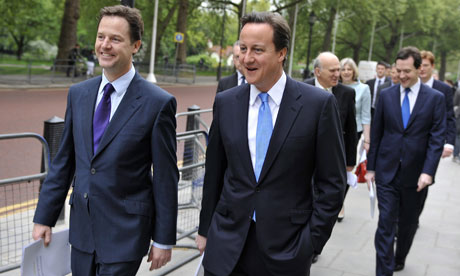 The alternative to the coalition government’s economic strategy; over 250,000 people marched in favour of it at the weekend and, according to YouGov’s latest poll, 41% of voters would support the Labour party in delivering it. But answers to the question ‘what exactly is this alternative?’ remain varied, elusive and vague at best. A protest march organised and funded by a collection of public service unions can’t be expected to present anything more than a self interested message of opposition, but politicians who claim to represent these protesters in parliament should be able to present a substantial alternative plan. Unfortunately Ed Milliband’s balancing act is continuing as he tries to both appear to be on the side of the public sector protesters but also have a realistic economic plan for the country. The only way to do this is to remain vague about what exactly his government would do differently. So when Miliband addressed the TUC rally on Saturday he said of the alternative that so many people had come to march for: ‘two thirds of diddly squat’ as Boris Johnson put it. Probably for the best as his one mention of necessary cutbacks was met with heckling, the honest truth might have got him lynched. The truth being that a Labour government would have no choice but to follow a broadly similar strategy to the coalition, meaning big cuts and redundancies in the public sector. Exactly what the TUC march was rallying against. This puts the Labour leader’s appearance at the rally into serious question, with the Mayor of London describing it as ‘the most disgusting cheat and fraud’. Rumours of discontent from sections of the Labour ranks exist too, mainly over Miliband placing the anti-cuts campaign on a par with the American civil rights movement and the anti-apartheid struggle in South Africa.
The alternative to the coalition government’s economic strategy; over 250,000 people marched in favour of it at the weekend and, according to YouGov’s latest poll, 41% of voters would support the Labour party in delivering it. But answers to the question ‘what exactly is this alternative?’ remain varied, elusive and vague at best. A protest march organised and funded by a collection of public service unions can’t be expected to present anything more than a self interested message of opposition, but politicians who claim to represent these protesters in parliament should be able to present a substantial alternative plan. Unfortunately Ed Milliband’s balancing act is continuing as he tries to both appear to be on the side of the public sector protesters but also have a realistic economic plan for the country. The only way to do this is to remain vague about what exactly his government would do differently. So when Miliband addressed the TUC rally on Saturday he said of the alternative that so many people had come to march for: ‘two thirds of diddly squat’ as Boris Johnson put it. Probably for the best as his one mention of necessary cutbacks was met with heckling, the honest truth might have got him lynched. The truth being that a Labour government would have no choice but to follow a broadly similar strategy to the coalition, meaning big cuts and redundancies in the public sector. Exactly what the TUC march was rallying against. This puts the Labour leader’s appearance at the rally into serious question, with the Mayor of London describing it as ‘the most disgusting cheat and fraud’. Rumours of discontent from sections of the Labour ranks exist too, mainly over Miliband placing the anti-cuts campaign on a par with the American civil rights movement and the anti-apartheid struggle in South Africa.
The Labour leadership’s backing of the march, whilst undoubtedly popular with the public sector workforce, could perhaps lead to greater scrutiny of their plans for the economy. Clearly there is a contradiction of being both on the side of thousands of people who oppose cuts in the public sector and still claiming to support Alistair Darling’s plan of action, which by his own admission involved public sector cuts that would exceed those of Margaret Thatcher. The deputy leader of the Labour party Harriet Harman was asked seven times on Monday to clarify the party’s position on public sector cuts, hopefully a sign of increased media scrutiny towards the party. Harman initially admitted there would be job losses under a Labour government before backtracking to say that Labour simply would not have increased public sector employment. After several more attempts to get some real detail from her, Harman was asked to name but one cut that Labour would make to reduce the deficit. All she could come up with was ‘we would consolidate back room functions’. Hopefully continued pressure will put upon Labour leadership to reveal a detailed alternative plan and be honest about their position. A real debate over what the best course of action is could then take place. Something tells me that is not going to happen since saying as little as possible and avoiding making difficult choices is proving to be so popular. But with Portugal slipping closer to a bailout in the last week (with their minority government unable to pass a deficit reducing budget) we should be glad that our other two major political parties have come together to take the hard decisions in tacking our country’s economic mess.

